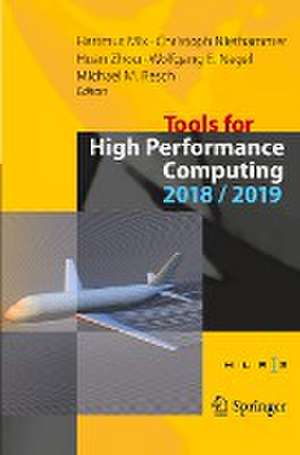Tools for High Performance Computing 2018 / 2019: Proceedings of the 12th and of the 13th International Workshop on Parallel Tools for High Performance Computing, Stuttgart, Germany, September 2018, and Dresden, Germany, September 2019
Editat de Hartmut Mix, Christoph Niethammer, Huan Zhou, Wolfgang E. Nagel, Michael M. Reschen Limba Engleză Paperback – 23 mai 2022
High-performance computing plays an increasingly important role for numerical simulation and modeling in academic and industrial research. At the same time, using large-scale parallel systems efficiently is becoming more difficult. A number of tools addressing parallel program development and analysis has emerged from the high-performance computing community over the last decade, and what may have started as a collection of a small helper scripts has now matured into production-grade frameworks. Powerful user interfaces and an extensive body of documentation together create a user-friendly environment for parallel tools.
| Toate formatele și edițiile | Preț | Express |
|---|---|---|
| Paperback (1) | 639.59 lei 6-8 săpt. | |
| Springer International Publishing – 23 mai 2022 | 639.59 lei 6-8 săpt. | |
| Hardback (1) | 645.79 lei 6-8 săpt. | |
| Springer International Publishing – 22 mai 2021 | 645.79 lei 6-8 săpt. |
Preț: 639.59 lei
Preț vechi: 752.45 lei
-15% Nou
Puncte Express: 959
Preț estimativ în valută:
122.42€ • 127.32$ • 102.59£
122.42€ • 127.32$ • 102.59£
Carte tipărită la comandă
Livrare economică 13-27 martie
Preluare comenzi: 021 569.72.76
Specificații
ISBN-13: 9783030660598
ISBN-10: 3030660591
Ilustrații: VIII, 270 p. 118 illus., 106 illus. in color.
Dimensiuni: 155 x 235 mm
Greutate: 0.4 kg
Ediția:1st ed. 2021
Editura: Springer International Publishing
Colecția Springer
Locul publicării:Cham, Switzerland
ISBN-10: 3030660591
Ilustrații: VIII, 270 p. 118 illus., 106 illus. in color.
Dimensiuni: 155 x 235 mm
Greutate: 0.4 kg
Ediția:1st ed. 2021
Editura: Springer International Publishing
Colecția Springer
Locul publicării:Cham, Switzerland
Cuprins
Detecting disaster before it strikes: On the challenges of automated building and testing in HPC environments.- Saving Energy Using the READEX Methodology.- The MPI Tool Interfaces: Past, Present, and Future—Capabilities and Prospects.- A tool for runtime analysis of performance and energy usage in NUMA systems.- Usage experiences of performance tools for modern C++ code analysis and optimization.- Performance Analysis of Complex Engineering Frameworks.- System-wide Low-frequency Sampling for Large HPC Systems.- Exploring Space-Time Trade-Off in Backtraces.- Enabling Performance Analysis of Kokkos Applications with Score-P.- Regional Profiling for Efficient Performance Optimization.- Effortless Monitoring of Arithmetic Intensity with PAPI’s Counter Analysis Toolkit.- ONE View: a fully automatic method for aggregating key performance metrics and providing users with a synthetic view of HPC applications.- A picture is worth a thousand numbers – Enhancing Cube’s analysis capabilities with plugins.- Advanced Python Performance Monitoring with Score-P.
Textul de pe ultima copertă
This book presents the proceedings of the 12th International Parallel Tools Workshop, held in Stuttgart, Germany, during September 17-18, 2018, and of the 13th International Parallel Tools Workshop, held in Dresden, Germany, during September 2-3, 2019. The workshops are a forum to discuss the latest advances in parallel tools for high-performance computing.
High-performance computing plays an increasingly important role for numerical simulation and modeling in academic and industrial research. At the same time, using large-scale parallel systems efficiently is becoming more difficult. A number of tools addressing parallel program development and analysis has emerged from the high-performance computing community over the last decade, and what may have started as a collection of a small helper scripts has now matured into production-grade frameworks. Powerful user interfaces and an extensive body of documentation together create a user-friendly environment for parallel tools.
